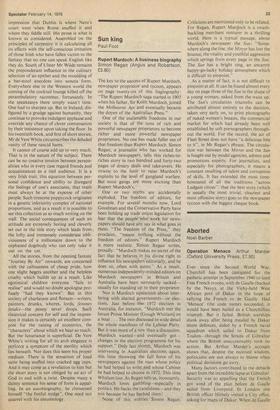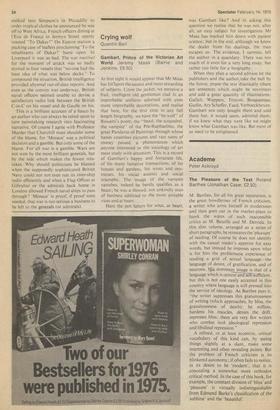Aborted
Noel Barber Operation Menace Arthur Marder (Oxford University Press, £7.50) Ever since the Second World War, Churchill has been castigated for the pathetic attempt in September 1940 to land Free French troops, with de Gaulle (backed by the Navy), at the Vichy-held West African port of Dakar in the hope of rallying the French to de Gaulle. Had 'Menace' (the code name) succeeded, it would have been hailed as a Churchillian triumph. But it failed. British warships slunk away after being mauled by Dakar shore defences, aided by a French naval squadron which sailed to Dakar from Toulon—through the Straits of Gibraltar where the British unaccountably took no action. But Arthur Marder's account shows that, despite the received wisdom, politicians are not always to blame when political decisions go awry.
Many factors contributed to the debacle apart from the incredible lapse at Gibraltar. Security was so appalling that the French got wind of the plan before de Gaulle sailed from Liverpool. In London one British officer blithely visited a City office, asking for maps of Dakar. When de Gaulle stalked into Simpson's in Piccadilly to order tropical clothes he announced he was off to West Africa. French officers dining at l'Ecu de France in Jermyn Street openly toasted "To Dakar!" On Euston station a packing case of leaflets proclaiming To the inhabitants of Dakar!' burst open. In Liverpool it was as bad. The war materiel for the moment of attack was so badly stowed in four vessels that "no-one had the least idea of what was below decks." To compound the situation. British intelligence provided abysmal out-of-date reports. And even as the convoy was underway. British naval officers seemed unable to devise a satisfactory radio link between the British C-in-C on his vessel and de Gaulle on his.
This is a brilliant account of a fiasco by an author who can always be relied upon to turn painstaking research into fascinating narrative. Of course I agree with ProfesSor Marder that Churchill must shoulder some of the blame, for 'Menace' was a political decision and a gamble. But only some of the blame. For all war is a gamble. Wars are not won by the most brilliant generals, but by the side which makes the fewest mistakes. Why should politicians be blamed when the supposedly sophisticated British Navy could not not even run its inter-ship radio efficiently and when a Flag Officer at Gibraltar or the admirals back home in London allowed French naval ships to pass through? 'Menace' is proof, if proof were needed, that war is too serious a business to be left to the generals (or admirals).



































 Previous page
Previous page